OpenAI Made A Movie Trailer Using Sora Technology - And It's A Little Disturbing
AI, or artificial intelligence, has been a hot buzzword for a while now. For years, the concept was relegated to science fiction, with the prospect of something more intelligent than humans bringing about the end of humanity, like in "Terminator." In today's real world, AI still represents an existential threat, and it's one that could impact the livelihoods of numerous people as well as the very concept of artistic expression itself.
On February 15, OpenAI introduced a new text-to-video model called Sora. With it, people can input whatever prompts they want and receive a video up to one minute in length that includes camera movement and vibrant landscapes. On X, formerly known as Twitter, OpenAI uploaded several examples of what the technology can do, including a Sora-generated movie trailer featuring a man in a red, wool helmet. The result is relatively impressive, with the humans looking fairly lifelike, where one man's eyes even seem to pierce the lens of the camera to look right at the viewer.
Prompt: "A movie trailer featuring the adventures of the 30 year old space man wearing a red wool knitted motorcycle helmet, blue sky, salt desert, cinematic style, shot on 35mm film, vivid colors." pic.twitter.com/0JzpwPUGPB
— OpenAI (@OpenAI) February 15, 2024
As a movie trailer, there's not much there in terms of plot or characters, but it looks real enough. And that same thread on X contains other videos to show off Sora, including a woman walking down a street and an AI-generated animation of a monster by a candle. It's intriguing to see what can now be rendered with a few lines of text but also disheartening for what it means for so many talented human artists out there. And that's not even getting into the implications of creating videos of real people doing who knows what.
Many are already worried for their jobs after seeing OpenAI's Sora demonstration
In the X thread, OpenAI stated that it's working to reign in Sora somewhat: "We are working with red teamers — domain experts in areas like misinformation, hateful content, and bias — who are adversarially testing the model." However, it's still reasonable to think things could go haywire with this technology in the wrong hands, especially with Silicon Valley's notorious "move fast and break things" ethos. A lot of damage could be caused, especially when it comes to movie studios that may be interested in replacing large swaths of VFX artists and animators with the narrow-minded goal of chasing short-term profits.
A Reddit thread about the Sora demonstration is filled with pessimistic comments from people worried about what their jobs could look like in the near future (if they exist at all). Redditor u/mtojay captured many people's opinions when they wrote, "I know we like to tell each other that its just another tool we need to incorporate in to our workflow. but i cant look at these news and advancements and not think i will be out of a job in the next 5 to 10 years." Much of the thread consists of comments about how people have told themselves for a while AI wasn't that good yet, but it's getting better consistently.
It's not hard to imagine a scenario where a movie studio would want a fully (or at least mostly) AI-generated film at some point. It's one thing to use the technology to make Star Wars look like a '90s anime as a lark, but this could fundamentally change the entertainment industry. Art is the most human thing we have. What could happen if we take away art's humanity and replace it with lifelike, yet soulless, visages?

